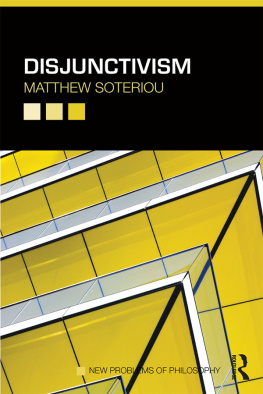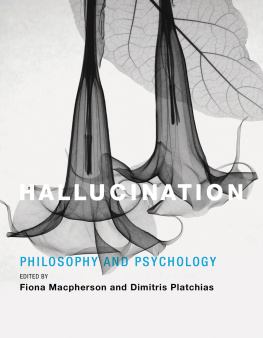Soteriou - Disjunctivism
Here you can read online Soteriou - Disjunctivism full text of the book (entire story) in english for free. Download pdf and epub, get meaning, cover and reviews about this ebook. year: 2016, publisher: Taylor and Francis, genre: Religion. Description of the work, (preface) as well as reviews are available. Best literature library LitArk.com created for fans of good reading and offers a wide selection of genres:
Romance novel
Science fiction
Adventure
Detective
Science
History
Home and family
Prose
Art
Politics
Computer
Non-fiction
Religion
Business
Children
Humor
Choose a favorite category and find really read worthwhile books. Enjoy immersion in the world of imagination, feel the emotions of the characters or learn something new for yourself, make an fascinating discovery.
Disjunctivism: summary, description and annotation
We offer to read an annotation, description, summary or preface (depends on what the author of the book "Disjunctivism" wrote himself). If you haven't found the necessary information about the book — write in the comments, we will try to find it.
Disjunctivism — read online for free the complete book (whole text) full work
Below is the text of the book, divided by pages. System saving the place of the last page read, allows you to conveniently read the book "Disjunctivism" online for free, without having to search again every time where you left off. Put a bookmark, and you can go to the page where you finished reading at any time.
Font size:
Interval:
Bookmark:

DISJUNCTIVISM
It is commonly held that the experiences involved in cases of perception, illusion and hallucination all have the same nature. Disjunctivists deny this. They maintain that the kind of experience you have when you perceive the world isnt one you could be having if you were hallucinating. A number of important debates in the philosophy of mind and epistemology turn on the question of whether this disjunctivist view is tenable.
This is the first book-length introduction to this contested issue. Matthew Soteriou explains the accounts of perception that disjunctivists seek to defend, such as nave realism, and the accounts to which they are opposed, such as sense-datum theories and representationalist theories. He goes on to introduce and assess key questions that arise in these debates:
Is disjunctivism consistent with what has been established by the science of perception?
Does introspective reflection support nave realism?
Can disjunctivism be motivated by appeal to the role that perception plays in enabling us to think demonstratively about mind-independent objects and qualities in our environment?
Does disjunctivism offer the best account of perceptual knowledge?
What can disjunctivists say about the nature of hallucination and illusion?
Including chapter summaries, annotated further reading and a glossary, this book is an ideal starting point for anyone studying disjunctivism for the first time, as well as for more advanced students and researchers.
Matthew Soteriou is a professor of Philosophy at the University of Warwick, UK. He is the author of The Minds Construction: The Ontology of Mind and Mental Action (2013), and co-editor (with Lucy OBrien) of Mental Actions (2009).
NEW PROBLEMS OF PHILOSOPHY
Series Editor: Jos Luis Bermdez
Routledges New Problems of Philosophy series has a most impressive line-up of topical volumes aimed at upper-level undergraduate and graduate students in philosophy and at others with interests in cutting edge philosophical work. The authors are influential figures in their respective fields and notably adept at synthesizing and explaining intricate topics fairly and comprehensively.
John Heil, Monash University, Australia, and Washington University, St Louis, USA
This is an outstanding collection of volumes. The topics are well chosen and the authors are outstanding. They will be fine texts in a wide range of courses.
Stephen Stich, Rutgers University, USA
The New Problems of Philosophy series provides accessible and engaging surveys of the most important problems in contemporary philosophy. Each book examines a topic or theme that has either emerged on the philosophical landscape in recent years, or a longstanding problem refreshed in light of recent work in philosophy and related disciplines. Clearly explaining the nature of the problem at hand and assessing attempts to answer it, books in the series are excellent starting-points for undergraduate and graduate students wishing to study a single topic in depth. They will also be essential reading for professional philosophers. Additional features include chapter summaries, further reading and a glossary of technical terms.
Also available:
Analyticity
Cory Juhl and Eric Loomis
Fiction and Fictionalism
Mark Sainsbury
Physicalism
Daniel Stoljar
Noncognitivism in Ethics
Mark Schroeder
Moral Epistemology
Aaron Zimmerman
Embodied Cognition
Lawrence Shapiro
Self-Knowledge
Brie Gertler
Semantic Externalism
Jesper Kallestrup
Consequentialism
Julia Driver
Images
John V. Kulvicki
Attention
Wayne Wu
Egalitarianism
Iwao Hirose
Cognitive Phenomenology
Elijah Chudnoff
Forthcoming:
Metaphysics of Identity
Andr Gallois
Perception
Adam Pautz
Modal Epistemology
Otvio Bueno and Scott Shalkowski
Consciousness
Rocco J. Gennaro
Abstract Entities
Sam Cowling
Cognitive Architecture
Philip Robbins
Properties
David Robb
Innateness and Cognition
Mark Cain
Relativism
Maria Baghramian and Annalisa Coliva
Imagination
Fabian Dorsch
Social Metaphysics
Amie L. Thomasson
DISJUNCTIVISM
Matthew Soteriou

First published 2016
by Routledge
2 Park Square, Milton Park, Abingdon, Oxon OX14 4RN
Simultaneously published in the USA and Canada
by Routledge
711 Third Avenue, New York, NY 10017
Routledge is an imprint of the Taylor & Francis Group, an informa business
2016 Matthew Soteriou
The right of Matthew Soteriou to be identified as the author of this work has been asserted by him in accordance with sections 77 and 78 of the Copyright, Designs and Patents Act 1988.
All rights reserved. No part of this book may be reprinted or reproduced or utilised in any form or by any electronic, mechanical, or other means, now known or hereafter invented, including photocopying and recording, or in any information storage or retrieval system, without permission in writing from the publishers.
Trademark notice: Product or corporate names may be trademarks or registered trademarks, and are used only for identification and explanation without intent to infringe.
British Library Cataloguing in Publication Data
A catalogue record for this book is available from the British Library
Library of Congress Cataloging in Publication Data
Sherman, Jon Foley, 1972
A strange proximity : stage presence, failure, and the ethics of attention /Jon Foley Sherman.
pages cm
Includes bibliographical references and index.
ISBN 978-1-138-90776-8 (hardback) ISBN 978-1-138-90777-5 (pbk.) ISBN 978-1-315-69490-0 (ebook) 1. ActingPsychological aspects. 2. Stage presence. I. Title.
PN2058.S53 2016
792.028019dc23
2015036214
ISBN13: 978-0-415-68621-1(hbk)
ISBN13: 978-0-415-68622-8(pbk)
ISBN13: 978-1-315-63683-2(ebk)
Typeset in Joanna
by Swales & Willis Ltd, Exeter, Devon, UK
I owe thanks to colleagues and students at the Philosophy Department at Warwick University for helpful discussions of this work. To Hemdat Lerman and Guy Longworth I owe special thanks for providing me with extremely useful written comments on a draft of the book. I am grateful to Tony Bruce and Adam Johnson of Routledge for their encouragement and patience, and I thank Susanna Siegel and two anonymous referees for their very helpful comments and advice.
My deepest thanks go to my wife, Sandra, who has helped me in more ways than I could ever hope to express, and to whom I dedicate this book with all my love.
Perceptual experiences are often divided into three broad categories: veridical perceptions, illusions, and hallucinations. A common way of distinguishing these three categories is as follows. In the case of a veridical perception you perceive an object in your environment as it really is for example, you see a red object in your environment and you really do see its red colour. In the case of an illusion, you succeed in perceiving some object in your environment, but the object you perceive isnt the way it perceptually seems to you to be for example, you see a green object in your environment, but the object looks red to you. And in the case of hallucination, you fail to perceive any object in your environment for example, you have an experience as of a red object, but you fail to perceive any object in your environment. Many maintain that the same account should be given of the nature of the conscious experience that occurs in each of these three cases. Those who hold a disjunctive theory of perception deny this. And they reject the claim that the same kind of experience is common to all three cases because they hold views about the nature of veridical perception that are inconsistent with it.
Next pageFont size:
Interval:
Bookmark:
Similar books «Disjunctivism»
Look at similar books to Disjunctivism. We have selected literature similar in name and meaning in the hope of providing readers with more options to find new, interesting, not yet read works.
Discussion, reviews of the book Disjunctivism and just readers' own opinions. Leave your comments, write what you think about the work, its meaning or the main characters. Specify what exactly you liked and what you didn't like, and why you think so.




